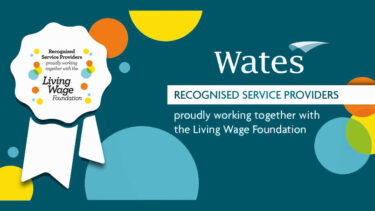Wates has recently launched its five-year ‘Creating Opportunities’ strategy. Described as ‘an evolutionary rather than revolutionary’ approach to social value, it contains some bold and challenging commitments. But has social value lost its force amidst the global pandemic?
Social value’s place in a pandemic
The pandemic has made the world a more difficult place to live in. We’re unable to see friends and family, many people have faced furlough or redundancy and our health and wellbeing is being tested on a global scale.
The impact has been particularly severe on those people on the margins of society. According to the ONS, half a million more people are out of work since the pandemic and about 60% of those people are aged 16-24. This rise in unemployment places those confronted with additional barriers even further back in the queue. Care leavers, ex-offenders, ex-Services, people dealing with homelessness or living with disability – those without a network, without a guiding hand and without the bank of mum and dad – are now facing fewer routes to employment and greater obstruction to social mobility.
The question is what can we, as major employers, do about it?

CREATING OPPORTUNITIES HAS NEVER BEEN MORE IMPORTANT
Keeping social value on the agenda
When we began mapping out Wates’ social value strategy in January, COVID-19 was but a nebulous dot on the horizon. When the pandemic reached the UK and the global crisis took hold, like many businesses we were forced to take swift action, make hard choices and adapt to protect our future.
The pandemic delayed the original release of our strategy, but it didn’t change the emphasis; coronavirus made the need for responsible business to provide a cogent response to the needs of our society all the more pressing. The focus of ‘Creating Opportunities’ – on challenging inequality, inspiring young people and supporting social enterprises – is even more pertinent than it was at the start of the year.
Indeed, the government’s updated Procurement Policy Note of September 2020 is specific on the extent to which social value must now be ‘explicitly evaluated’ in all central government procurement – a noticeable shift from ‘considered’ in its previous iteration in the Public Services (Social Value Act) 2012. So, it’s extremely heartening to see that social value hasn’t lost its place in the government’s plan for pandemic recovery.
We chose to purposefully align our social value strategy with the United Nations Sustainable Development Goals which seek to address global issues including poverty, climate change, inequality and justice. The United Nations celebrated its 75th anniversary in the midst of the pandemic and the SDGs turned five and its celebratory film ‘Urgent Solutions for Urgent Times’ demonstrates that supporting our societies has never been more important.
An evolutionary yet ambitious approach
Considering social value is nothing new – companies have had corporate responsibility or sustainability policies in place for decades – but it is only in recent years that they have been able to more accurately measure the broader impacts of these programmes. Our strategy isn’t radical nor is it a revolutionary approach for us. It focuses on themes we strive to influence as a leader in the built environment sector; the material areas we know we have the power to make a difference. But it is certainly not complacent. It contains some bold targets and tough commitments and ones that will be challenging to achieve.

Commitments such as our Group-wide determination to become a Recognised Real Living Wage Service Provider and asking all our customers to consider implementing the Real Living Wage on their contracts with us; or our commitment to spend a further £25m with social enterprises (SEs) by 2025 and roll out a business mentoring programme to enable at least five SEs to reach national scale. We’re also going to employ one person from groups that are furthest from the workforce on every single project we deliver and inspire and educate a minimum of 25,000 young people in the next five years.
In short, we’re going to create opportunities for a wider range of people, particularly those on fringes of society, and we’re going to find new and better ways to reach them. Building on a new foundation of digital engagement developed during this year with work experience, site tours and Q&A sessions, our Virtual Insight Day earlier this month saw more than 550 people take part in interactive sessions on completing job applications and gaining interview skills – far more people from much further afield than we would have been able to engage during an in-person event.
Levelling up through social value
Irrespective of how we as a society manage the impact of COVID-19, there is no denying there is a considerable amount of work to be done to level up geographically, economically and socially and reduce the widening equality gap. We need to all consider what we can do to take positive action to help reshape the future.
As one of the largest family-owned companies in the UK, it is our duty to confront social imbalance and be a force for good. We will continue to help inspire better ways of creating the places, communities and businesses of tomorrow. Delivering social value is intrinsic to that and our strategy is rooted in a firm belief that how we do business is as important as what we do.





